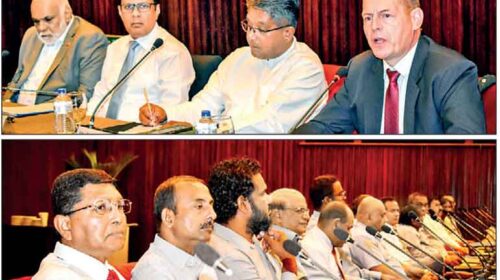Northern Province, ILO and EY collaborate to advance private sector investments
 The Northern Province Governor’s Office, International Labour Organisation (ILO) and Ernst & Young (EY) collaborated to organise stakeholder meetings on generating investment-driven growth in the Northern Province.
The Northern Province Governor’s Office, International Labour Organisation (ILO) and Ernst & Young (EY) collaborated to organise stakeholder meetings on generating investment-driven growth in the Northern Province.
These meetings focused on the agriculture, animal husbandry, fisheries/aquaculture, apparel, food processing, and tourism sectors and were attended by private and public sector representatives relating to these sectors.
The Northern Province has extensive, but largely underutilised, resources that are very favourable for agriculture, animal husbandry, fisheries/aquaculture, and food processing activities and is a fertile ground for apparel and tourism. These have been identified as priority sectors for the Province’s development, along with the income generation, and employment for the people of the Province, while also contributing to the national economy. However, investment into the Province has been slow. The objective of the stakeholder meeting was to brief potential investors about the opportunities in these sectors and identify the issues and challenges which hinder investments.
Addressing the gathering, Northern Province Governor Jeevan Thiagarajah, set out the vision for the development of the Province. With ease of doing business being a key factor to be improved, the Governor spoke about the establishment of a single-entry window for investors to facilitate their entry into the Province. The Governor also spoke of the plans for development of “smart” agriculture and aquaculture, while underscoring the priority of achieving food security.
He noted that with the infusion of modern technology, productivity could be significantly increased, thereby generating surpluses with export potential. The Governor also highlighted that less than 5% of the marine resources of the province are currently being utilised and emphasised that this is an area with significant potential along with the development of inland fisheries. Addressing the issue of environmental sustainability, Governor Thiagarajah said that he intends to position the Northern Province as a “Green Province”, with the planting of trees, development of water catchment areas and green spaces.
ILO Chief Technical Advisor Thomas Kring elaborated on the background to the stakeholder meeting which is an initiative of ILO’s Local Empowerment through Economic Development and Reconciliation (LEED+) Project. Reiterating the importance of private sector investment in fuelling sustainable growth, Kring noted that the “ILO, through the LEED+ project has been able to facilitate successful private sector partnerships where the gains of growth are shared by both the company and local community. It’s a win-win proposition, and we have proven that it works.” He also spoke of plans to scale up and replicated the LEED+ approach at national level. Supported by the Australian Government Department of Foreign Affairs and Trade (DFAT) and the Government of Norway, the LEED+ project is part of the ILO’s global Jobs for Peace and Resilience programme.
During the event Ernst & Young Partner Arjuna Herath made a presentation on the key bottlenecks for private sector investments in the Northern Province. Speaking during his presentation, Herath said that the Northern Province has already seen the establishment of some successful ventures in the specified sectors, which demonstrates that the challenges could be addressed and overcome. He also went on to say, “we are optimistic that more investments could be facilitated into sectors that have the potential to succeed in the Northern Province”.
Participants at the meeting highlighted several issues faced by investors in the Northern Province, specifically issues relating to availability of land for commercial use, noting that the fragmentation of land is not conducive to large-scale agriculture which is required for export-oriented production. Other issues discussed related to unavailability of support services such as laboratory testing facilities, lack of skilled labour, poor water quality, and reliability of power supply.
These meetings are the first in a series of stakeholder meetings which will culminate in a national-level business forum bringing together key strategic partners and networks. The final outcome of the process is the development of a policy document and action plan for creating an enabling economic environment for growth through private sector partnerships and sustainable investments.